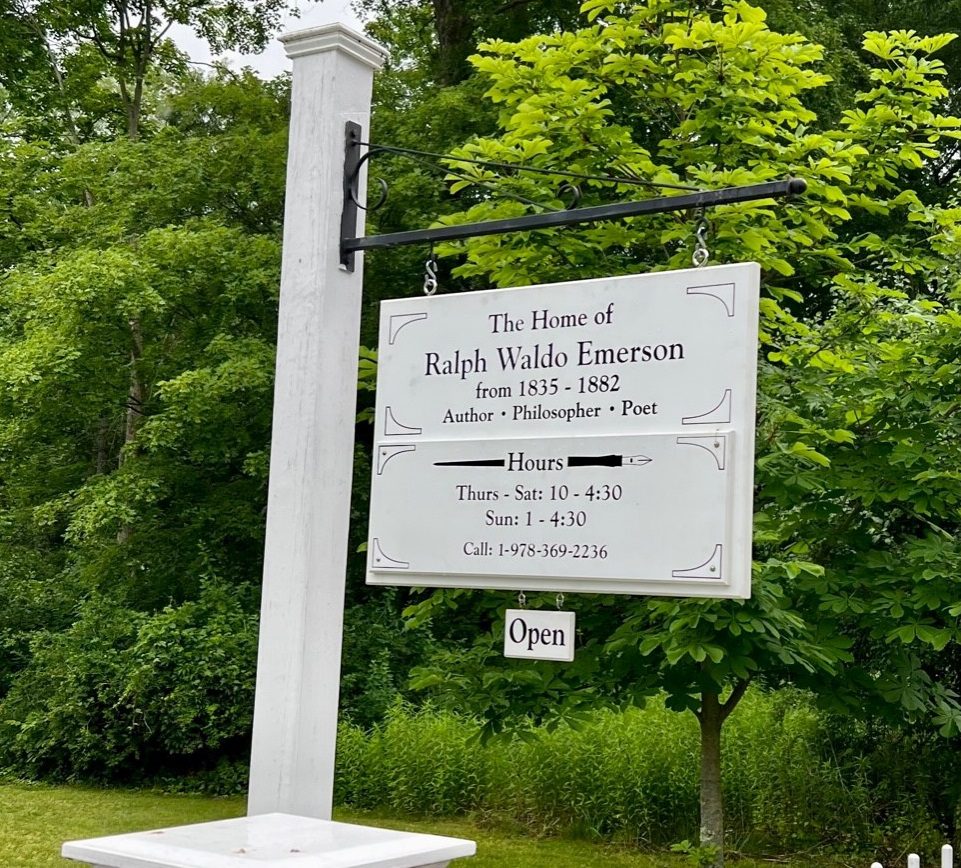
Traveling
I sit comfortably on an antique settee covered in red velvet, just a couple of feet from a round oak table that functioned as a writing desk for one of my intellectual heroes, Ralph Waldo Emerson. The setting is Emerson’s study in his home in Concord, Massachusetts.
An affable older woman who serves as a docent stands behind the desk chair. It’s stained in a lighter color than the desk and built in a different style. She speaks expertly about the acclaimed 19th-century American essayist, poet, and minister—about Emerson’s life and work, family and friends, and especially about his influence.
Her thin dark eyebrows rise each time she mentions “Emerson’s close friend,” Henry David Thoreau.
At the other end of the settee, just at the limit of my left side’s peripheral vision, sits my seventeen-year-old daughter Meredith, and seated to the right of us is my close friend Jim and his wife Teresa.
All of us are visiting from our hometown of Austin, Texas. Meredith and I are here for her to visit colleges in the area. Jim and Teresa are here celebrating Jim’s birthday and remembering his time at Harvard Law School when they lived nearby.
As Emerson understood, “When friendships are real, they are the solidest things we can know.” Among the many things I value in my friendship with Jim is the interest we share in Emerson’s life and work.
Seeing
My appreciation for Emerson began nearly three decades ago when I was just a few years older than Meredith. A beloved teacher introduced us. In the years since then, Emerson has helped me see many things more clearly.
He helps me see and re-see the importance of cultivating and maintaining trust. We need to develop a capacity to trust ourselves if we are to hope to trust others; and this kind of reciprocal trust, which is an affirmation of another’s trustworthiness, lies at the heart of human relationships and human flourishing. Emerson helps me see all of this.
Emerson also helps me see firmer life paths to travel, and importantly, what paths I do well to forego and leave for others.
He also helps me cultivate and embrace what can make the human heart sing, whether mine or another’s.
As a result, he helps me hope.
I think Jim would say similar things when it comes to Emerson helping him see.
Trusting
On this drizzly June morning in Concord, Massachusetts, at 55 years of age, with a progressive illness that takes from me movement and other things I want and need, and which grows harder to manage over time, I look around the study.
I see a woman whose love of learning and teaching others grounds her being in the world. I see a dear friend. I see a devoted couple who help one other become more themselves, and I think of my wife Tracey. I see one of our daughters, who, with her sister Holly, evoke in Tracey and me a type and intensity of love I never imagined possible before I laid eyes on them.
I see what an illness–even one that thrives on what it takes–can never diminish.
I dab my eyes and then look over at Jim, who appears to be similarly moved; and then I look at Meredith, who flashes her lovely smile when the docent answers her series of questions; and I see what Emerson meant when he wrote, “To be yourself in a world that is constantly trying to make you something else is the greatest accomplishment.”
Meredith will soon be making a big decision, especially for a seventeen-year-old; namely, she’ll choose where to spend four or more years learning, contributing, growing, and, I pray, experiencing profound meaning, purpose, and joy, even as she deepens her trust—in others and in herself.
Perhaps Emerson will be one who helps Meredith see, just as he did me. I hope others will help her see, too. I have in mind those who invite her to think and feel and trust in ways she never has; those who point her toward firm intellectual and personal and even ethical paths on which to travel; those who help her heart sing new tunes, in new keys, and make her eyebrows rise when she speaks of what brings her joy and gives her hope.
I hope Holly will see and experience her own versions of all of this, too.
As much as anything, I hope that when Meredith and Holly are middle-aged they will have at least one cherished friend with whom they share a deep appreciation for many things and that this same friend shows an unwavering willingness to stand with them and walk by their side.
Come what may.
__________
Allan Cole is Dean of the Steve Hicks School of Social Work at The University of Texas at Austin, where he also serves as the Bert Kruger Smith Centennial Professor in Social Work and, by courtesy, as Professor of Psychiatry and Behavioral Sciences at the Dell Medical School. Diagnosed with Parkinson’s in 2016, at the age of 48, he is the author or editor of more than a dozen books on a range of topics related to chronic illness, bereavement, anxiety, and spirituality. His latest books are Jumping to the Skies: Additional Lessons from Parkinson’s Disease (Cascade, 2023) and Riding the Wave: Poems (Resource Publications, 0ff-press soon). Other recent books include Discerning the Way: Lessons from Parkinson’s Disease (Cascade), In the Care of Plenty: Poems (Resource Publications), and Counseling Persons with Parkinson’s Disease (Oxford University Press). Follow him on Twitter @allancoleut.
